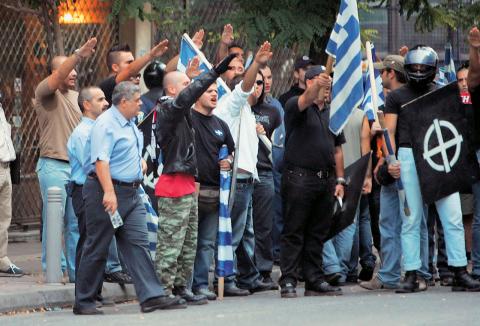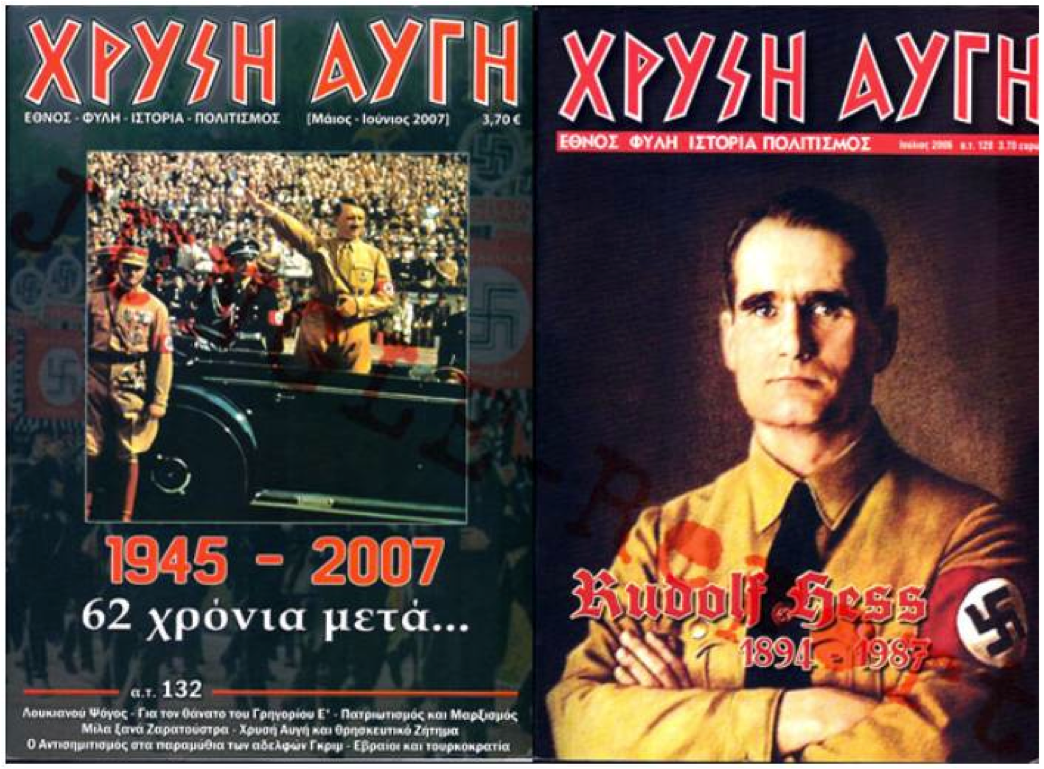Golden Dawn and the deafening silence of Europe

With a neo-Nazi party on the rise in Greece, it seems that even a Weimar-like scenario might be tolerable for EU leaders insisting on further austerity. By Jerome Roos.
“For Peace, Freedom and Democracy. Never Again Fascism. Millions of Dead Remind Us”. Those are the words carved into a memorial stone underneath the Austrian house where Adolf Hitler was born in 1889. “Never Again”. Thus was the uniform slogan resounding across Europe after the full scale of Nazi horror became known in the wake of WWII. The cosmopolitan project of European integration was founded upon this promise. Never again would fascists and warmongers be allowed to tear the Old Continent and its people apart.
One day it may therefore be considered one of history’s greatest ironies that, as EU leaders were busy deciding who would collect its Nobel Prize for “the advancement of peace and reconciliation, democracy and human rights,” those same leaders remained woefully silent when a recent survey indicated that the neo-Nazi Golden Dawn party now polls third in Greece, at 14% — a showing comparable to that of Hitler’s National Socialist German Workers’ Party in 1930, three years before rising to power and setting the world on course for WWII.
For clarity’s sake: the comparison made between National Socialism and Golden Dawn is by no means an exaggeration. We are talking about an extreme-right organisation whose emblem deliberately resembles a swastika; whose leader publicly gave the Nazi salute upon his election to Parliament; whose magazine regularly features articles and pictures of the Führer himself; whose spokesman recently assaulted two female rivals on a live TV show; whose manifesto pledges to raid all immigrants out of hospitals and all non-Greek children out of kindergartens; and whose MPs actively participate in racist pogroms against Greece’s immigrant population. (Oh, and by the way, Golden Dawn’s favourite band is called Pogrom, known for such hits as “Auschwitz” and “Speak Greek Or Die”. Incidentally, its former bassist is now one of Golden Dawn’s 18 MPs.)
No surprise, then, that even the mild-mannered BBC is now making eerie comparisons with the early days of the austerity-stricken Weimar Republic. It is happening again. Fascism is once again on the rise in Europe. And what do EU leaders have to say about this? Nothing, it seems. As neo-Nazi militia run amok in the streets of Athens, Brussels and Berlin remain forever shrouded in a deafening silence. The only thing European leaders seem to care about is that Greece repays its debts. Democracy, human rights and the rule of law have all been relegated to secondary concerns — to serve financial interests, even a strong flavor of fascism now appears to be tolerable.
On Monday, a spokesman for the German Chancellor Angela Merkel told journalists that the cancellation of Greece’s debt would be “in violation” of German budget laws. But when the Guardian published a terrifying report on forty anti-fascist activists who had been tortured by police in prison — with some beaten up to the point of severe bruising and broken bones and others forced to strip naked, bend over and spread their buttcheeks while reciting fascist slogans to their comrades — no European official seemed to care enough to declare these acts to be “in violation” of the Third Article of the European Convention of Human Rights prohibiting torture.
In fact, European leaders couldn’t care less. Back in May, José Manuel Barroso, President of the European Commission, publicly questioned the neo-Nazi label of Golden Dawn, conveniently declining any form of responsibility by vaguely stating that “we have to define what a neo-Nazi party is, which can only be done at national level.” When a senior Greek police officer confirmed this weekend that the Greek government wilfully allowed “pockets of fascism” to infiltrate the police force so it could “use them for its own purposes”, Barroso — and with him the entire European establishment — preferred to play dumb and keep his head firmly in the sand.
 Image: Two covers of Golden Dawn’s official party magazine. Still, the President of the European Commission refuses to define Golden Dawn as a ‘neo-Nazi’ party.
Image: Two covers of Golden Dawn’s official party magazine. Still, the President of the European Commission refuses to define Golden Dawn as a ‘neo-Nazi’ party.
So far, the only person who has pledged to investigate Golden Dawn is the Commissioner of Human Rights, Nils Muižnieks, but his commission is part of the Council of Europe, an independent Strasbourg-based paper tiger that is entirely separate from the EU. What’s more, the commission’s concern was entirely discredited when, on 1 October, Golden Dawn MP Eleni Zaroulia joined the Committee on Equality and Non-Discrimination of the Parliamentary Assembly of the Council of Europe. A few weeks later, on 18 October, Zaroulia made a declaration in Greek Parliament stating that “immigrants are subhuman”. So much for equality and non-discrimination.
But Golden Dawn’s sudden rise in the institutions is perhaps the least of Greece’s troubles. It’s its presence in the streets and its infiltration of the police force that is the greatest cause of concern. In August, following the racist murder of a 19-year-old Iraqi, the Migrant Workers Association reported over 500 hate attacksin the previous six months alone. A report last week confirmed that more than half of these attacks were perpetrated by gangs of men in paramilitary uniforms — one of the trademarks of Golden Dawn’s Sturmabteilung. The numbers are likely to be only the tip of the iceberg, as many victims are simply too terrified to report abuse and violence.
Earlier this month, Golden Dawn MP Ilias Panayiotaros was caught on video during a mob attack on a theatre, hurling homophobic abuse at the director of a critical play, beating up anti-fascist protesters trying to protect the theatre and a journalist trying to do his job, and finally freeing an arrested fellow fascist from a police van. All this time, police officers stood by and did nothing. No wonder: Golden Dawn proudly claims “60% support” among the police force. Not only do officers deliberately ignore criminal complaints and emergency calls by immigrants and activists; it is now commonly known that they actively refer Greeks who have “problems” with immigrants to Golden Dawn. As the Greek state crumbles under the weight of its debt repayments, Golden Dawn has stepped in to fill the void.
Never again, we used to say. Never again. How much more blatant does the situation need to get for Europe to at least express its concern and admit that the problem exists? How is it possible that a Nobel Peace laureate simply ignores the rise of violent neo-Nazi elements in its midst? Perhaps the answer is simply that European leaders realize how deeply implicated they are in the rise of Golden Dawn. Perhaps they prefer to stay silent because they know that admitting the resurgence of fascism on the continent could greatly complicate the austerity agenda they are pushing unto the European periphery. Perhaps, then, even a strong flavor of fascism might be tolerable — as long as Greece continues to service its debt.
Originally published on and copyleft Roarmag.org.
Image top - Golden Dawn members with party leader Nikolaos Michaloliakos (front left).
